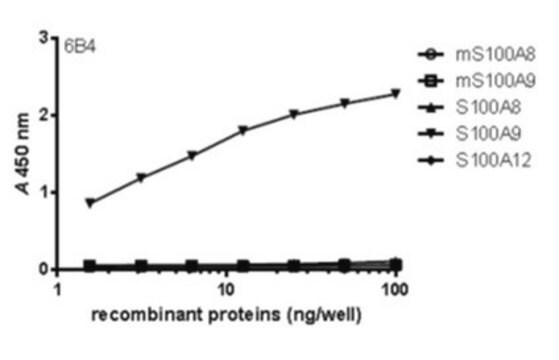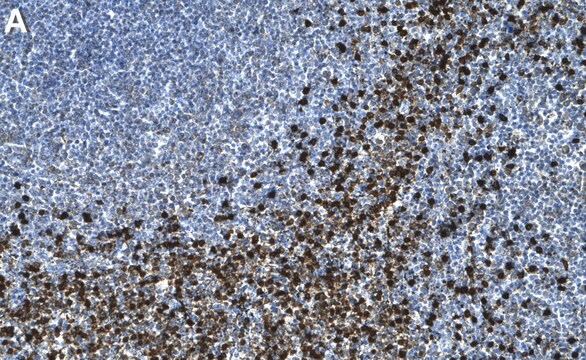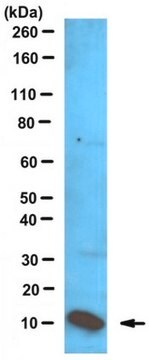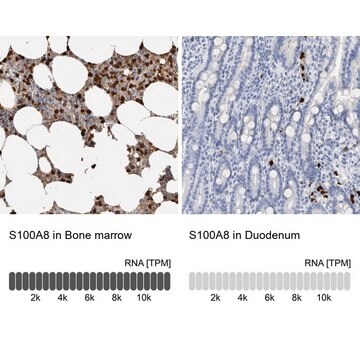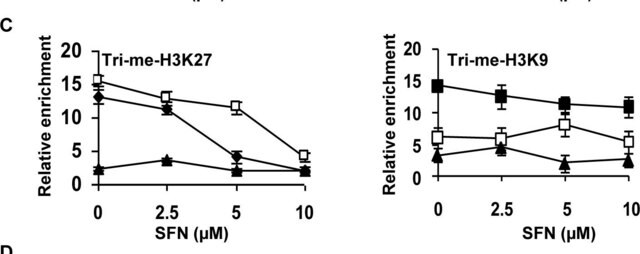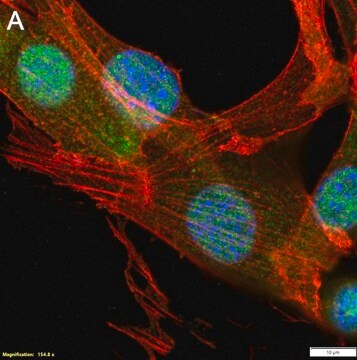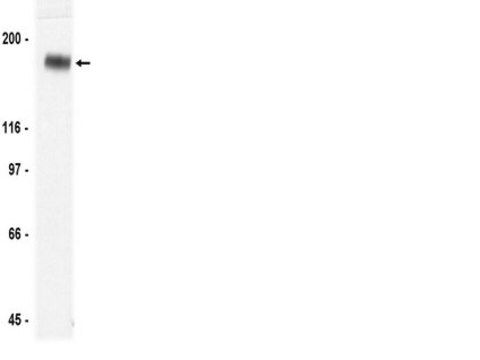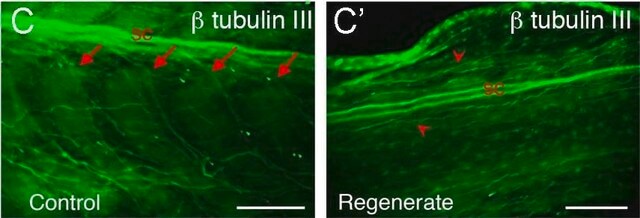MABF291
Anti-S100A8/S100A9 Antibody, clone 5.5
clone 5.5, from mouse
Synonym(e):
Protein S100-A9, Calgranulin-B, Calprotectin L1H subunit, Leukocyte L1 complex heavy chain, Migration inhibitory factor-related protein 14, S100 calcium-binding protein A9, AMRP-14, p14, Protein S100-A8, Calgranulin-A, Calprotectin L1L subunit, Cystic fi
About This Item
Empfohlene Produkte
Biologische Quelle
mouse
Qualitätsniveau
Antikörperform
purified immunoglobulin
Antikörper-Produkttyp
primary antibodies
Klon
5.5, monoclonal
Speziesreaktivität
human
Methode(n)
ELISA: suitable
flow cytometry: suitable
immunohistochemistry: suitable
immunoprecipitation (IP): suitable
western blot: suitable
Isotyp
IgG1κ
Versandbedingung
wet ice
Posttranslationale Modifikation Target
unmodified
Angaben zum Gen
human ... S100A8(6279) , S100A9(6280)
Allgemeine Beschreibung
Spezifität
Immunogen
Anwendung
Entzündung & Immunologie
Immunologische Signalübertragung
Western Blotting Analysis: A representative lot of this antibody was used to detect S100A8/S100A9 in neutrophil extracts (Hogg et al., 1989).
Immunoprecipitation Analysis: A representative lot of this antibody was used to detect S100A8/S100A9 in Human monocyte and neutrophil lysate (Edgeworth, J., et al., (1991) JBC. 266(12):7706-7713).
Immunoprecipitation Analysis: A representative lot of this antibody was used to detect S100A8/S100A9 in MRP-8 and TL-14 mutant lysate (Hessian P.A., et al., (2001) Eur. J. Biochem. 268:353-363).
Immunohistochemistry Analysis: A representative lot of this antibody was used to detect S100A8/S100A9 in Human Bronchus tissue (Hogg, N., et al., (1989) Eur. J. Immunol. 19:1053-1061).
Immunohistochemistry Analysis: A representative lot of this antibody was used to detect S100A8/S100A9 in spleen and thymus tissue (Hogg, N., et al., (1989) Eur. J. Immunol. 19:1053-1061).
ELISA: A representative lot of this antibody was used to detect S100A8/S100A9 in ELISA (Ryckman, C., et al., (2003) Arthritis & Rheumatism. 48(8):2310-2320).
Qualität
Flow Cytometry Analysis: A 1:80 dilution (0.25 µg) of this antibody detected S100A8 and/or S100A9 in 1x10E6 PBMCs.
Zielbeschreibung
Physikalische Form
Lagerung und Haltbarkeit
Sonstige Hinweise
Haftungsausschluss
Sie haben nicht das passende Produkt gefunden?
Probieren Sie unser Produkt-Auswahlhilfe. aus.
Lagerklassenschlüssel
12 - Non Combustible Liquids
WGK
WGK 1
Flammpunkt (°F)
Not applicable
Flammpunkt (°C)
Not applicable
Analysenzertifikate (COA)
Suchen Sie nach Analysenzertifikate (COA), indem Sie die Lot-/Chargennummer des Produkts eingeben. Lot- und Chargennummern sind auf dem Produktetikett hinter den Wörtern ‘Lot’ oder ‘Batch’ (Lot oder Charge) zu finden.
Besitzen Sie dieses Produkt bereits?
In der Dokumentenbibliothek finden Sie die Dokumentation zu den Produkten, die Sie kürzlich erworben haben.
Unser Team von Wissenschaftlern verfügt über Erfahrung in allen Forschungsbereichen einschließlich Life Science, Materialwissenschaften, chemischer Synthese, Chromatographie, Analytik und vielen mehr..
Setzen Sie sich mit dem technischen Dienst in Verbindung.